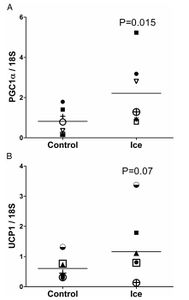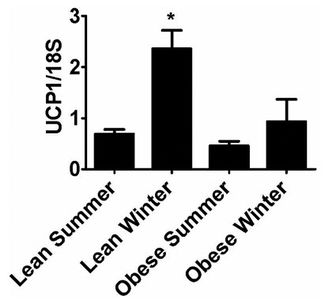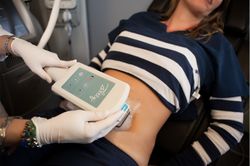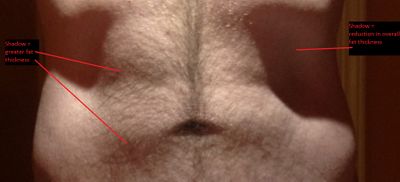CoolSculpting and DIY CoolSculpting (Cryolipolysis)
CoolSculpting uses cold to reduce fat and it can be effective as long as you know the limitations; a similar effect can be achieved cheaply at home. This approach is marketed as CoolSculpting® or Cryolipolysis®. It works by chilling the skin so that the underlying fat cells naturally die off, reducing the thickness of fat in the area treated. While commercial CoolSculpting requires expensive equipment, I've found that a similar effect can be produced at home for almost no cost.
1 What is CoolSculpting?
CoolSculpting uses an FDA approved device to chill the skin for up to an hour[1], with a session lasting one to three hours[2], producing a reduction in the fat thickness in the treated area. Animal and human studies have shown a reduction in fat thickness between 20% and 80% over 3 months following treatment[3]. The device sucks the skin and underlying fat into a cup[4]. More than one treatment can be used, but the results of the second treatment are not as dramatic as the first[5]. CoolSculpting is considered an alternative to liposuction, which is the most common type of plastic surgery.
2 How does CoolSculpting work?
The device removes heat from the skin at a constant rate, rather than chilling to a particular temperature. (I suspect that simple icing is not used to ensure the technique is patentable.) While the underlying mechanism is unclear[3], the current theory is that chilling fat tissues to just below freezing triggers inflammation of the fat cells (Panniculitis) and then triggers natural cell death in the fat cells (apoptosis). The inflammation starts 3 days after treatment, peaking at 30 days, with some residual inflammation seen after 90 days and the number of fat cells declining over the 90 day period[6]. However, there is a recent study showing that as little as 30 minutes of icing can change the gene expression of fat cells to improve their fat burning capability[7]. (The study also showed that in lean subjects, similar changes naturally occurred in winter, but far less change occurred in obese subjects.)
 Changes in fat burning capabilities due to 30 minutes of icing[7]. The markers represent each of the seven subjects. |
 Changes in seasonal fat burning capabilities of lean and obese subjects[7]. (A BMI of 30 was used to divide subjects.) |
3 How much fat is lost?
A study of CoolSculpting showed an average reduction of about 4mm after two months[5]. A second treatment had a lower reduction of an additional 1-2mm. There is an individual variation in response to CoolSculpting, with some practices reporting 30% of patients being 'unimpressed with the results[8].
4 What about frostbite?
A common concern is frostbite, or other damage to the skin. This is not a problem, as you need far colder temperatures (-10c/14f) to cause that type of damage[9][10]. CoolSculpting uses temperatures that do not immediately kill off the fat cells, but rather trigger the natural process of cell death (apoptosis). That's why CoolSculpting takes weeks or months for the full effect to be seen.
5 CoolSculpting compared with Cryosurgery
CoolSculpting is quite different to Cryosurgery, which uses cold to kill off tissue, such as tumors. Typically cryosurgery uses far lower temperatures (-20c/-4f to -40c/-40f) and immediately kills off the living cells (necrosis) [11]. Cell damage is caused by temperatures below -10c/14f[9][10] and CoolSculpting does not go that cold.
6 Side effects of CoolSculpting
There have been no serious side effects reported so far[3]. The skin being treated goes red, with some bruising and numbness. I suspect that the bruising may be because the CoolSculpting device sucks[12][4] the fat against the cooling device. These problems normally resolve within a week. Studies have shown no changes in blood lipid levels or liver function[1]. The numbness is not associated with nerve damage[4]. There are reports of a small number of patients having a prolonged (weeks), painful response to CoolSculpting[8], though a study of 528 patients that underwent 2,729 cycles showed only three cases of mild or moderate pain, which resolved within 4 days[13].
7 Weight Loss or Spot Reduction?
CoolSculpting reduces the fat thickness in the limited area that is treated rather than producing overall Weight Loss[3]. CoolSculpting does not seem to be effective in obese people, though it may simply be harder to observe the effects[3]. It's worth noting that CoolSculpting reduces the fat thickness in people who have a stable weight; in other words, you don't need to be on a diet for it to work.
8 How long does it take to work?
The effects of CoolSculpting should start within a few weeks, but the full effect may take 3-4 months[6]. Tests indicate that the changes are noticeable after 2-7 weeks (average 4 weeks)[5].
9 DIY CoolSculpting
Having reviewed the evidence for the commercial CoolSculpting, I wondered if it would be possible to replicate the effects by simply applying ice to the skin. An early study of CoolSculpting showed a reduction in the fat levels from -1c/31f, though not as great a loss as colder temperatures[14]. The levels of fat on my legs are noticeably lower than other parts of my body, which might be the result of regular icing. There is evidence that applying ice to the skin produces an inflammation response in just a few minutes[1], so this approach seems viable. Use only ice cubes in a bag. Never use gel packs as these are cold enough to cause skin damage. For more details, see Cryotherapy.
9.1 Testing 'DIY CoolSculpting'
So I undertook a simple experiment and applied a bag of ice to the left side of my abdomen for 1-3 hours a day for two weeks. I generally did this in the evenings, applying the ice while watching TV or reading. While the ice is initially uncomfortable and cold, this sensation disappears in a couple of minutes. It also seems that after the first few times the ice is applied, the discomfort is far less.
9.2 Results of DIY CoolSculpting
At the end of the two weeks the fat thickness on the left side was noticeably thinner than the right side. The difference seemed to increase in the week following termination of the icing. It's hard to evaluate exactly how much change occurred in a few weeks, and I'm already quite thin (<10% body fat), so small differences are more noticeable than would be the case on someone larger. I used Skinfold Calipers to check my abdominal skinfold thickness and found a 2mm difference (measured 2 inches to the side of my navel). This is enough to be obvious to me, but not to show up well on photographs. Below are a couple of pictures that attempt to capture the resulting asymmetry.
9.3 The Duration of DIY CoolSculpting Changes
The research into CoolSculpting suggests that it takes 3-4 months for the full effect. Because I applied the CoolSculpting more to the left side of my abs, it is possible to see how long the effects last. I used DIY CoolSculpting in May 2012 for a period of a few weeks. In the following two years my weight fluctuated by around 15 pounds. I performed no more DIY CoolSculpting or icing of my abs during that time. Regardless of these fluctuations the slight difference in the two sides remained constant. This difference is slight, amounting to around 1-2mm, but is noticeable on inspection. This suggests that the effects of DIY CoolSculpting last for at least two years and probably much longer. Obviously DIY CoolSculpting does not prevent overall weight gain, but it's unclear if it will limit this gain in any way.
9.4 How to perform DIY CoolSculpting
I iced for 1-3 hours most days, which is far more than CoolSculpting which uses a single 1 hour session. I have no idea if 'more is better' or if a single hour every couple of months is optimal. None of the research I found had any indication of the dose/response relationship. The latest research suggests that 30 minutes might be enough to induce changes.
9.5 DIY CoolSculpting Questions and Answers
Here are some of the questions I've been asked about DIY CoolSculpting along with my answers.
- Is this a replacement for diet and exercise? Absolutely not. This approach will reduce the level of fat in a given area rather than producing an overall reduction in body fat.
- Do you apply the ice directly or use a barrier such as a cloth? I normally apply the bag of ice directly to the skin. Sometimes I'll use a thin layer such as a tee shirt for a few minutes until the skin adjusts and then remove the layer. This prevents the sudden drop in temperature from making me squeal.
- Is DIY CoolSculpting the same as drinking ice water? No, it's quite different. This approach triggers local removal of fat rather than changing the overall metabolism. (Drinking a gallon of ice water will only use about 70 Calories, so that is not a great solution to Weight Loss.)
- Is DIY CoolSculpting like applying an ice pack as described in The Four Hour Body? No, the four hour body uses ice to chill the body overall rather than reduce the fat in a local area.
- What happens to the fat that is lost? The absolute level of fat lost in this technique is not huge, so the calories made available from the fat is probably inconsequential.
- A rough estimate is that each treatment covers around 10cm x 3cm and produces a 4mm fat loss, which is 12,000 mm3 or 12ml. 12ml is about 11 grams of fat, or about 100 Calories. Over three months that's about one Calorie per day. Treating multiple areas will increase this, but it appears most clinics would only treat 2-3 areas at a time.
- How did you see results in two weeks when the studies say it takes several months? The animal studies of CoolSculpting showed that the process started after about 3 days, with the removal of the fat apparent between 14 and 30 days and from day 30 to 90 the process declined. Therefore it is not unreasonable to see some results after two weeks. Also, CoolSculpting uses one hour long chilling, whereas I was chilling for 1-3 hours a day for two weeks, which is a lot more treatment.
- Is there any corresponding skin tightening? In my experiment, there was not enough fat loss to make a difference to skin tension. Overall, CoolSculpting and DIY CoolSculpting are unlikely to produce the dramatic overall fat loss that would lead to sagging skin.
- Is 'DIY CoolSculpting' the same as the real thing? No, the DIY approach of applying ice is different to CoolSculpting, which uses a single session applied for a shorter period.
- Does 'DIY CoolSculpting' work the same way as Commercial CoolSculpting? It's hard to know for sure, but I believe the underlying mechanism is the same. DIY CoolSculpting could be burning more calories to keep the body warm, but that would produce an overall Weight Loss, not a spot reduction. Another mechanism, such as increased blood flow, could be behind the spot reduction, but that does not seem likely. Commercial CoolSculpting removes heat at a constant rate[14], where this DIY CoolSculpting uses the constant temperature of the ice, so the DIY version may not be as effective. However, the DIY can be applied far more frequently than the commercial approach.
10 References
- ↑ 1.0 1.1 1.2 CoolSculpting for subcutaneous fat layer red... [Lasers Surg Med. 2009] - PubMed - NCBI http://www.ncbi.nlm.nih.gov/pubmed/20014262
- ↑ CoolSculpting - Patient FAQs http://www.coolsculpting.com/heres-the-skinny/patient-faq/
- ↑ 3.0 3.1 3.2 3.3 3.4 CoolSculpting for reduction of excess a... [Semin Cutan Med Surg. 2009] - PubMed - NCBI http://www.ncbi.nlm.nih.gov/pubmed/20123423
- ↑ 4.0 4.1 4.2 Aesthetic Plastic Surgery, Volume 33, Number 4 - SpringerLink http://www.springerlink.com/content/3h17qp3gk314ut17/
- ↑ 5.0 5.1 5.2 Non-invasive CoolSculpting for body contouri... [Lasers Surg Med. 2012] - PubMed - NCBI http://www.ncbi.nlm.nih.gov/pubmed/22334296
- ↑ 6.0 6.1 CoolSculpting for noninvasive fat cell destruc... [Dermatol Surg. 2009] - PubMed - NCBI http://www.ncbi.nlm.nih.gov/pubmed/19614940
- ↑ 7.0 7.1 7.2 PA. Kern, BS. Finlin, B. Zhu, N. Rasouli, RE. McGehee, PM. Westgate, EE. Dupont-Versteegden, The Effects of Temperature and Seasons on Subcutaneous White Adipose Tissue in Humans: Evidence for Thermogenic Gene Induction., J Clin Endocrinol Metab, pages jc20142440, Oct 2014, doi 10.1210/jc.2014-2440, PMID 25299843
- ↑ 8.0 8.1 Zeltiq sometimes painful, variable results | Christopher B. Zachary FRCP http://www.drzachary.net/2010/06/20/variability-in-responses-to-cryolipolysis/
- ↑ 9.0 9.1 Critical temperature for skin necrosis in experi... [Cryobiology. 1982] - PubMed - NCBI http://www.ncbi.nlm.nih.gov/pubmed/7105779
- ↑ 10.0 10.1 What temperature is lethal for cells? [J Dermatol Surg Oncol. 1979] - PubMed - NCBI http://www.ncbi.nlm.nih.gov/pubmed/110858
- ↑ All About Cryosurgery http://hassam.hubpages.com/hub/All-About
- ↑ CoolSculpting http://www.newmanmdplasticsurgery.com/CoolSculpting.html
- ↑ W. G. Stevens, L. K. Pietrzak, M. A. Spring, Broad Overview of a Clinical and Commercial Experience With CoolSculpting, Aesthetic Surgery Journal, volume 33, issue 6, 2013, pages 835–846, ISSN 1090-820X, doi 10.1177/1090820X13494757
- ↑ 14.0 14.1 Selective cryolysis: a novel method of non-i... [Lasers Surg Med. 2008] - PubMed - NCBI http://www.ncbi.nlm.nih.gov/pubmed/18951424


